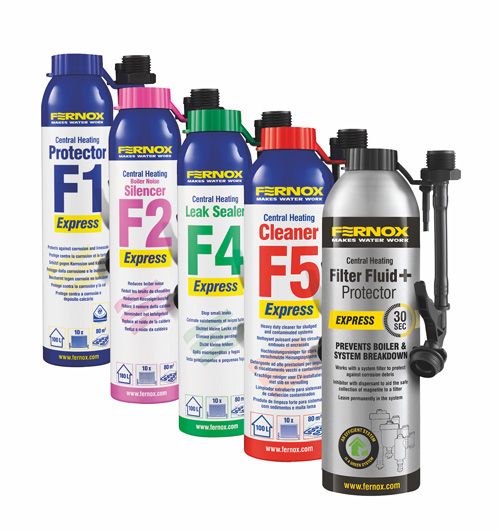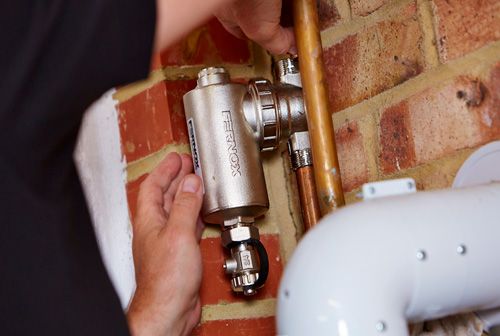

Francine Wickham, global marketing director at Fernox, explains the importance of chemical water treatment and filter technology – reviewing the types of products installers currently have at their disposal.
Chemical water treatment plays a crucial role in keeping central heating systems and boilers working efficiently and effectively.
Essentially, it all comes down to preventing corrosion from taking place – the result of a chemical reaction between the metal contained within a heating system and the circulating water. If corrosion does occur, it can cause a build-up of sludge and contaminants.
System blockages are bad news. They inevitably lead to the system becoming sluggish, resulting in the boiler using more energy than required to reach a desired temperature. For the customer, this translates into higher fuel bills, reduced efficiency, boiler and system breakdown.
Fortunately, chemical water treatment provides a cost effective and simple solution. There are water treatment products available on the market that will help to restore and maintain a boiler’s efficiency and keep systems working as intended.

Cleaners
These are an important first step on the path to a healthy heating system. When selecting a cleaner, it is important to choose a brand that is suitable for use with all the metals found within a heating system. We would always advise installers to opt for a non-foaming chemical cleaner, which works effectively to agitate and lift debris but which is also fast to remove form the system and saves the installer time on-site.
Once dosed, the cleaner should be left to circulate within the system for up to seven days prior to flushing to ensure all contaminants are completely removed during the cleaning process.
Inhibitors
Once the debris has been removed, a high-quality inhibitor should be used to create a barrier between the metal surface and the circulating water, preventing further corrosion before it has a chance to begin to form. Inhibitors are essential to keeping a system in optimum condition, and as installers will be aware, have long been incorporated into Part L of the Building Regulations – Conservation of Fuel and Power as a mandatory requirement for England and Wales.
Not all inhibitors offer the same level of protection and quality. For absolute assurance, installers should select a proven inhibitor that incorporates three different types of inhibitor molecules – organic, anodic and cathodic molecules. All three molecules react differently with the metals contained within the system to reduce significantly the risk of corrosion.

Filters
It also now best practice to recommend combining chemical water treatments with a filter for a comprehensive approach to system efficiency and boiler protection. Again, be aware that not all system filters provide the same type or level of protection.
The most effective filters combine multiple methods of filtration to ensure that both magnetic and non magnetic debris is trapped and contained for safe removal. Filters utilising magnetic, hydrocyclonic, hydronic particle separation and deaeration action are more effective at protecting the boiler and system by removing all harmful debris and contaminants.
Scale Reducers
Finally, it is important that installers consider the level of water hardness – a factor often overlooked in maintaining system efficiency. In 2014, we saw a tightening of the Building Regulations for commissioning new boilers. This specifies that scale reducers should be fitted if the water is harder than 200 parts per million (ppm).
To comply with the legislation and prevent limescale formation within a domestic heating system, installers can choose magnetic or electrolytic in-line scale reducers.
Using magnetic principles, magnetic scale reducers offer single appliance protection, while electrolytic scale reducers act as water conditioners to provide whole house protection.
Chemical water treatment, filters and scale reducers can all play a key role in securing the long-term future of a boiler and installers should be aware of all the options available to them. It is absolutely vital to understand how products work; performance and levels of protection will vary from manufacturer to manufacturer. Therefore, only ever opt for a trusted brand that, if required, can offer further technical advice, support and guidance.
